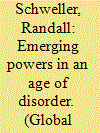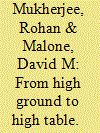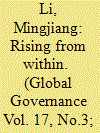|
|
|
Sort Order |
|
|
|
Items / Page
|
|
|
|
|
|
|
| Srl | Item |
| 1 |
ID:
107432


|
|
|
|
|
| Publication |
2011.
|
| Summary/Abstract |
THE DRAMATIC RISE OF CHINA AND INDIA AMONG OTHERS HAS SET THE STAGE
for a fundamental rethinking of world politics in an age of the waning dominance of US power as a force for remaking the world in its own image. While
Pax Americana is not yet teetering on the edge of collapse, the consensus opinion is that the relative decline of the United States is probably irreversible and
its unipolar moment will soon give way to something new. A “return to multipolarity” is one way of describing this shift. It tells us that several great powers will emerge to challenge US primacy. That is all. The more important
question is: What sort of global order will emerge on the other side of the transition from unipolarity to multipolarity? Will it be one of peace and plenty or
conflict and scarcity? On this issue, experts are divided into two camps, pessimists and optimists.
|
|
|
|
|
|
|
|
|
|
|
|
|
|
|
|
| 2 |
ID:
107434


|
|
|
|
|
| Publication |
2011.
|
| Summary/Abstract |
Independent India's multilateral strategy was designed defensively as a means to provide the country with some leeway in an intensely competitive bipolar world. Today, India casts itself as an emerging power intent on exerting the bilateral and multilateral influence that the country's founding leaders had long aspired to. Obsolete frameworks such as nonalignment and developing world leadership have mostly been jettisoned in the process. However, questions remain about India's willingness and capacity to take on global responsibilities to match its global aspirations. This article traces the evolution of India's multilateral approach and examinest is multilateral stance through several prisms: the UN Security Council, the World Trade Organization, global climate change negotiations, and some emerging international groupings of states in which India plays a role. Among our conclusions is that, in India's diplomacy, much depends on domestic factors.
|
|
|
|
|
|
|
|
|
|
|
|
|
|
|
|
| 3 |
ID:
107436


|
|
|
|
|
| Publication |
2011.
|
| Summary/Abstract |
The article examines the main approaches to multilateralism that coexist nn Russian foreign policy thinking. It argues that these approaches must be put in the context of the debate on multipolarity, which comes out as a direct opposition to the Western "collective unilateralism." Both as an abstract model and as a concrete practice, multipolarity is not synonymous with multilateralism; certain visions of a multipolar world, such as great-power management, are hardly compatible with multilateralism if the latter is grounded in the idea of equality of all participants in the international system. It is also crucial to take in to account the origins of the Russian doctrine of multipolarity in the particular context of Russia's uneasy relationship with the West. Against this background, it is clear that some traditional foreign policy strategies, such as balance of power, can result in both unilateralist and multilateralist outcomes. The article's main conclusion is that the contradictory dynamics of identity and security, in Russia and in the West, seem to produce a trend in favor of great-power management as the model of future international order. If this is true, it means that there is a move toward a type of international society where egalitarian multilateralism is replaced by a more hierarchical structure.
|
|
|
|
|
|
|
|
|
|
|
|
|
|
|
|
| 4 |
ID:
107433


|
|
|
|
|
| Publication |
2011.
|
| Summary/Abstract |
OUR UNIPOLAR WORLD IS PASSING INTO HISTORY, AS THE ECONOMIC CENTER OF
gravity shifts eastward and southward and new centers of power emerge. Our
international governance systems and institutions, constructed out of the ruins
of World War II and the Great Depression, have been steadily lagging the steepening curve of change. Meanwhile, as the world struggles with the aftershocks
of the global financial and economic crisis, terrorism, transnational crime and
drug trafficking, climate change, food security and energy prices, the Arab
Awakening, Japan's triple crises, failing and fragile states, the dangers of nuclear proliferation, and so forth, the virtues of multilateral cooperation are being
rediscovered. Many see renewed merit in pooling national sovereignty in cooperative institutional arrangements.1 At the same time, the preeminent power
in the international system, the United States, burdened by debt, hobbled by internal divisions, newly conscious of its limits, led by a president whose formative years are more North-South than East-West, is itself putting greater stock
in partnership and multilateral cooperation.2
In response to this unprecedented
pace and scope of change, old institutions are innovating and new forms and
varieties of international cooperation are being called into being
|
|
|
|
|
|
|
|
|
|
|
|
|
|
|
|
| 5 |
ID:
107437


|
|
|
|
|
| Publication |
2011.
|
| Summary/Abstract |
The article describes the evolution of Brazilian multilateralism since the First Pan American Conference in 1889. The impact of the domestic and international spheres are examined to understand the continuities and changes in Brazil multilateral attitudes. In our days, the increasing influence of Brazil international presence, especially in multilateral forums, is evident. The open question is how the emerging countries will influence the new international order.
|
|
|
|
|
|
|
|
|
|
|
|
|
|
|
|
| 6 |
ID:
107435


|
|
|
|
|
| Publication |
2011.
|
| Summary/Abstract |
What impact will the rise of China have on the existing international system? This article attempts to provide some clues for a better understanding of this issue by examining China's views on and policy toward international multilateralism in general and some of the newly emerging multilateral mechanisms in particular, including the Group of 20 and the BRICS. The article concludes that while China will become more proactive in its multilateral diplomacy, in many cases selectively, and increase its influence in global multilateral settings, various concerns and constraints will make it unlikely for China to completely overhaul or even dramatically reshape the multilateral architecture at the global level. China is likely to repeat its pattern of the past decade in East Asian regional multilateralism: participation, engagement, pushing for cooperation in areas that would serve Chinese interests, avoiding excessive responsibilities, blocking initiatives that would harm its in terests, and refraining from making grand proposals. In addition, China is stuck in defining its identity, and caught up between posturing as a leader of the developing world on some issues and siding with the developed countries on other policy issues. Given all of these constraints, China's involvement in global multilateralism is likely to be guided by pragmatism rather than grand visions. The article also argues that China will most likely strive to rise from within the existing international order. Washington should be prepared to plan its China policy on this basis and Sino-US relations will be shaped largely by the dynamics of contentions for power and interest as well as cooperation and coordination between China and the United States in various multilateral in stitutions.
|
|
|
|
|
|
|
|
|
|
|
|
|
|
|
|
|
|
|
|
|